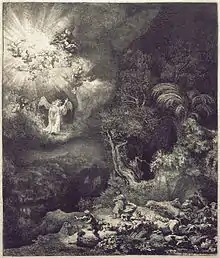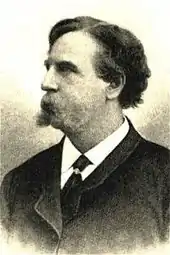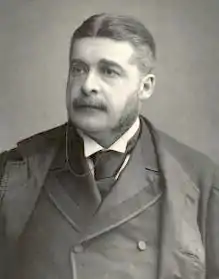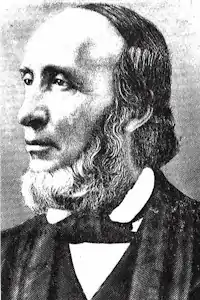It Came Upon the Midnight Clear
"It Came Upon the Midnight Clear", sometimes rendered as "It Came Upon a Midnight Clear", is an 1849 poem and Christmas carol written by Edmund Sears, pastor of the Unitarian Church in Wayland, Massachusetts. In 1850, Sears' lyrics were set to "Carol", a tune written for the poem the same year at his request, by Richard Storrs Willis. This pairing remains the most popular in the United States, while in Commonwealth countries, the lyrics are set to "Noel", a later adaptation by Arthur Sullivan from an English melody.
| It Came Upon the Midnight Clear | |
|---|---|
 The Angel Appearing to the Shepherds, 1634, by Rembrandt | |
| Genre | Christmas carol |
| Written | 1849 |
| Text | Edmund Sears |
| Based on | Luke 2:14 |
| Meter | 8.6.8.6 (CMD) |
| Melody | "Carol", by Richard Storrs Willis, or "Noel", adapted by Arthur Sullivan |
History
Edmund Sears composed the five-stanza poem in common metre doubled during 1849. It first appeared on December 29, 1849, in The Christian Register in Boston, Massachusetts.[1]
Sears served the Unitarian congregation in Wayland, Massachusetts, before moving on to a larger congregation in Lancaster. After seven years of hard work, he suffered a breakdown and returned to Wayland. He wrote It Came Upon the Midnight Clear while serving as a part-time preacher in Wayland.[2] Writing during a period of personal melancholy, and with news of revolution in Europe and the United States' war with Mexico fresh in his mind, Sears portrayed the world as dark, full of "sin and strife", and not hearing the Christmas message.[3]
Sears is said to have written these words at the request of his friend, William Parsons Lunt, pastor of United First Parish Church, Quincy, Massachusetts, for Lunt's Sunday school.[1] One account says the carol was first performed by parishioners gathered in Sears' home on Christmas Eve, but to what tune the carol was sung is unknown as Willis' familiar melody was not written until the following year.[2]
According to Ken Sawyer, Sears' song is remarkable for its focus not on Bethlehem, but on his own time, and on the contemporary issue of war and peace. Written in 1849, it has long been assumed to be Sears' response to the just ended Mexican–American War.[2] The song has been included in many of the Christmas albums recorded by numerous singers in the modern era.
Melody

In 1850 Richard Storrs Willis, a composer who trained under Felix Mendelssohn, wrote the melody called "Carol". This melody is most often set in the key of B-flat major in a 6/8 time signature. "Carol" is still the most widely known tune to the song in the United States.[1][4][5][6]

In Commonwealth countries, the tune called "Noel", which was adapted from an English melody in 1874 by Arthur Sullivan, is the usual accompaniment. This tune also appears as an alternative in The Hymnal 1982, the hymnal of the United States Episcopal Church.[7]
Lyrics
The full song comprises five stanzas. Some versions, including the United Methodist Hymnal[4] and Lutheran Book of Worship,[5] omit verse three, while others (including The Hymnal 1982) omit verse four.[8] Several variations also exist to Sears' original lyrics.
It came upon the midnight clear,
That glorious song of old,
From angels bending near the earth,
To touch their harps of gold:
"Peace on the earth, goodwill to men,
From heaven's all-gracious King."
The world in solemn stillness lay,
To hear the angels sing.
Still through the cloven skies they come,
With peaceful wings unfurled,
And still their heavenly music floats
O'er all the weary world;
Above its sad and lowly plains,
They bend on hovering wing,
And ever o'er its babel sounds
The blessed angels sing.
Yet with the woes of sin and strife
The world has suffered long;
Beneath the angel-strain have rolled
Two thousand years of wrong;
And man, at war with man, hears not
The love-song which they bring;
O hush the noise, ye men of strife,
And hear the angels sing.
And ye, beneath life's crushing load,
Whose forms are bending low,
Who toil along the climbing way
With painful steps and slow,
Look now! for glad and golden hours
come swiftly on the wing.
O rest beside the weary road,
And hear the angels sing!
For lo!, the days are hastening on,
By prophet bards foretold,
When with the ever-circling years
Comes round the age of gold
When peace shall over all the earth
Its ancient splendors fling,
And the whole world give back the song
Which now the angels sing.
References
- "It Came upon the Midnight Clear". www.hymntime.com. Archived from the original on October 19, 2013. Retrieved December 25, 2017.
- Sawyer, Ken. "It came upon a Unitarian midnight clear", UUWorld, November 1, 2002 Archived March 28, 2015, at the Wayback Machine
- Hughes, Peter. "Edmund Hamilton Sears", Dictionary of Unitarian and Universalist Biography, April 24, 2002 Archived May 20, 2015, at the Wayback Machine
- The United Methodist Hymnal, © 1989
- Lutheran Book of Worship, © 1978
- The official Unitarian-Universalist hymnal, Singing the Living Tradition, © 1993
- Raymond F. Glover, ed. (1985). The Hymnal 1982. New York City: The Church Hymnal Corporation. Hymn #90.
- Raymond F. Glover, ed. (1985). The Hymnal 1982. New York City: The Church Hymnal Corporation. Hymn #89.
External links
| Preceded by "Jingle Bells" by Kimberley Locke |
Billboard Adult Contemporary number-one single by Hall & Oates December 30, 2006 – January 6, 2007 |
Succeeded by "What Hurts the Most" by Rascal Flatts |
